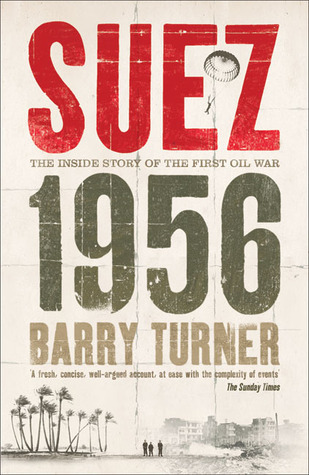While there are no shortage of candidates for the moment when the Western empires came to an end, one of the most popular is that of the failed attempt by Britain and France to reclaim the Suez Canal in the autumn of 1956. For all of the military gains made by their forces and their Israeli allies, Operation Musketeer (as the plan was called) ended with the humiliating withdrawal of European forces and a political triumph for the ruler of Egypt, Gamal Nasser. Though subsequently regarded as a military success but a political failure, Barry Turner is having none of it. As he argues in his flawed but informative book, the effort was "a military failure and a political disaster," one the effects of which were felt for decades to come.
Turner traces its origins to the early investigations by the French at the start of the 19th century to explore the possibility of building a canal connecting the Mediterranean and Red Seas. His narrative loses its focus early here, as he offers a much broader of the West's involvement with the entire Middle East during the 19th and 20th centuries than is really necessary. Once he gets into the details of the immediate events leading up to the decision to invade, however, his narrative improves, as he details the chain of decisions in Britain, Egypt, France, Israel, and elsewhere that led the British prime minister, Anthony Eden, to seek a military response to Nasser's decision to nationalize the Suez Canal in 1956. The preparation for the invasion is portrayed as a comedy of errors, as National Servicemen found themselves suddenly thrust into an operation for which they were completely unprepared, with outdated and poorly-maintained Second World War-era equipment that was often inferior to the Soviet-supplied weapons of their Egyptian foes. The invasion itself was conducted with what proved in retrospect an overabundance of caution, as the Egyptians found themselves unprepared for the conflict and facing a war on two fronts. Yet it was the Egyptians who emerged as the victors, as international pressure brought an end to the last hurrah of an old style of Western imperialism.
All of this is described in an accessible and informative manner, one that strives, usually with success, to convey the major personalities behind the conflict. Turner's use of quotes is a great strength in this respect, as he deploys the memoirs and interviews of the major participants to give color to his narrative, Yet Turner's book suffers from a some flaws of construction. Foremost is in the subtitle, as his claims of Suez as the "first oil war" are strained and backed by little evidence, imbalancing some of his other assessments in the process. His narrative is also heavily Anglo-centric in its focus, which further distorts his analysis of the roles played by various participants and decisions. As a result, while an enjoyable introduction of the Suez crisis, Turner's book falls short of being the dramatic and insightful study that this account deserves.

